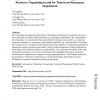Free Online Productivity Tools
i2Speak
i2Symbol
i2OCR
iTex2Img
iWeb2Print
iWeb2Shot
i2Type
iPdf2Split
iPdf2Merge
i2Bopomofo
i2Arabic
i2Style
i2Image
i2PDF
iLatex2Rtf
Sci2ools
138
click to vote
HICSS
2006
IEEE
2006
IEEE
Temporal Implications of Information Technology for Work Practices: Organizing in and for Time in an Emergency Department
We investigate the temporal implications of information technology by examining its use in the work practices of physicians and nurses in an emergency department. We conceptualize the temporality in work practices being constituted by temporal enactment (e.g., linearity), temporal construal (e.g., autonomy), and temporal spatiality (e.g., regionalization). By using this categorization we found that information technology impinges on temporal organizing by imposing its specific temporal logics and by being location dependent. Distinct information technologies have different impacts on temporality in work, and temporal effects of the same information technology vary across work groups. This highlights the need for alternative technological configurations to support varying temporal practices. The findings underscore the potential of information technology as a temporal boundary object that reconciles differences in temporal organization among work groups.
Biometrics | HICSS 2006 | Information Technology | System Sciences | Temporal Enactment | Temporal Implications |
Related Content
| Added | 11 Jun 2010 |
| Updated | 11 Jun 2010 |
| Type | Conference |
| Year | 2006 |
| Where | HICSS |
| Authors | Zixing Shen, Youngjin Yoo, Kalle Lyytinen |
Comments (0)

